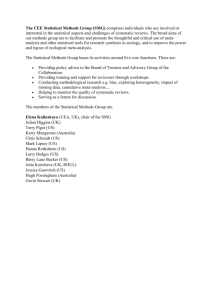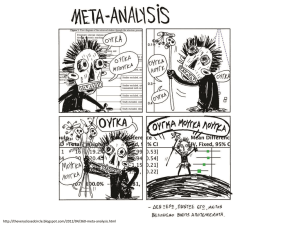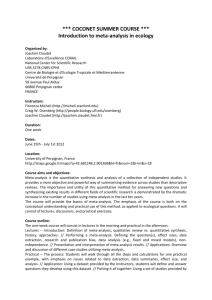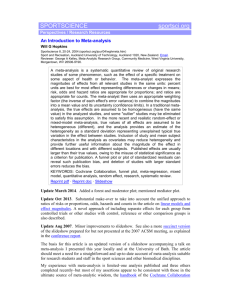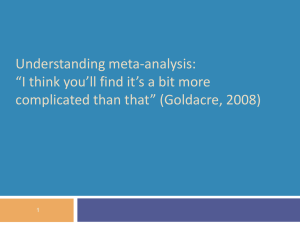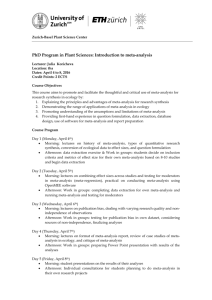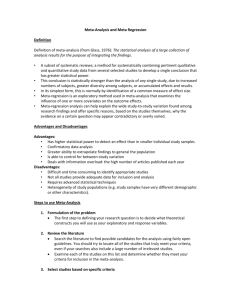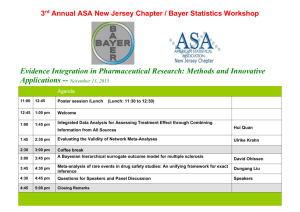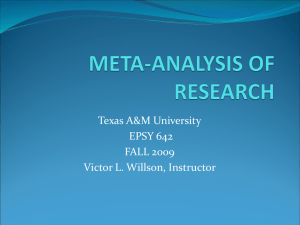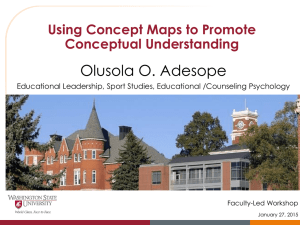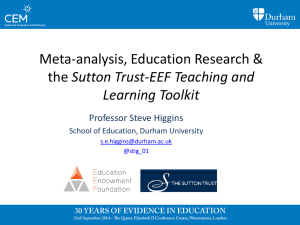Going beyond data synthesis: Meta
advertisement
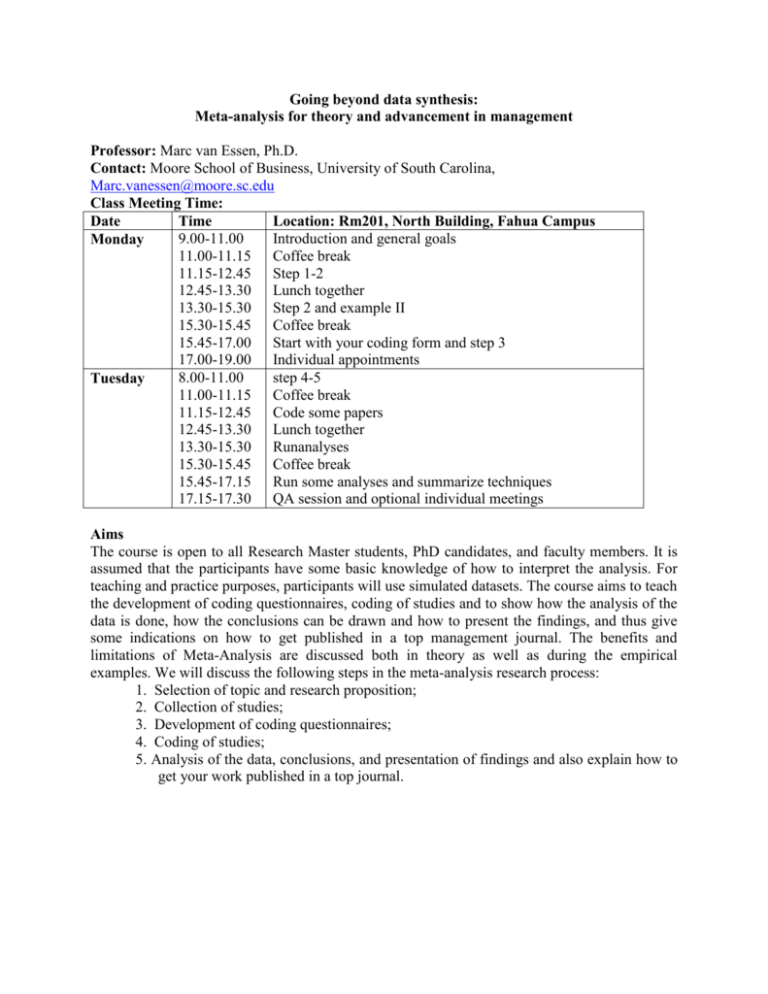
Going beyond data synthesis: Meta-analysis for theory and advancement in management Professor: Marc van Essen, Ph.D. Contact: Moore School of Business, University of South Carolina, Marc.vanessen@moore.sc.edu Class Meeting Time: Date Time Location: Rm201, North Building, Fahua Campus 9.00-11.00 Introduction and general goals Monday 11.00-11.15 Coffee break 11.15-12.45 Step 1-2 12.45-13.30 Lunch together 13.30-15.30 Step 2 and example II 15.30-15.45 Coffee break 15.45-17.00 Start with your coding form and step 3 17.00-19.00 Individual appointments 8.00-11.00 step 4-5 Tuesday 11.00-11.15 Coffee break 11.15-12.45 Code some papers 12.45-13.30 Lunch together 13.30-15.30 Runanalyses 15.30-15.45 Coffee break 15.45-17.15 Run some analyses and summarize techniques 17.15-17.30 QA session and optional individual meetings Aims The course is open to all Research Master students, PhD candidates, and faculty members. It is assumed that the participants have some basic knowledge of how to interpret the analysis. For teaching and practice purposes, participants will use simulated datasets. The course aims to teach the development of coding questionnaires, coding of studies and to show how the analysis of the data is done, how the conclusions can be drawn and how to present the findings, and thus give some indications on how to get published in a top management journal. The benefits and limitations of Meta-Analysis are discussed both in theory as well as during the empirical examples. We will discuss the following steps in the meta-analysis research process: 1. Selection of topic and research proposition; 2. Collection of studies; 3. Development of coding questionnaires; 4. Coding of studies; 5. Analysis of the data, conclusions, and presentation of findings and also explain how to get your work published in a top journal. Day 1 Discuss what meta-analysis is and how it has been applied in management and economics over the years. We discuss the three general goals (determine overall size of an effect, moderator analyses, mediation analyses) and discuss steps 1,2, and 3. Do ssome short exercises on how to develop a questionnaire and start coding of studies. Readings for day 1: Carney, M., Gedajlovic, E., Heugens, P.P.M.A.R., Van Essen, M., Van Oosterhout, H. 2011. Business Group Affiliation, Performance, Context, and Strategy: A Meta-Analysis. Academy of Management Journal, 0001-4273, 54(3), 437-460. Franke (2001), Applications of meta-analysis for marketing and public policy: A review, Journal of Public Policy & Marketing, 20 (2), 186-200. Geyskens et al. (2009) A review and evaluation of meta-analysis practices in management research. Journal of Management, 35, 393-419. Stanley (2001), Wheat from chaff: Meta-analysis as quantitative literature review, Journal of Economic Perspectives, 15 (3), 131-150. Van Essen, M., Otten, J., Carberry, E. Assessing managerial power theory: a metaanalytic approach to understanding the determinants of CEO compensation. Journal of Management. Cortina (2003), Apples and oranges (and pears, Oh my!): The search for moderators in meta-analysis, Organizational Research Methods, 6 (4), 415-439. Doucouliagos, H., &Ulubasoglu, M. A. 2008. Technical appendix for democracy and economic growth: A meta-analysis. Working Paper. Stanley and Jarrell (2005), Meta-regression analysis: A quantitative method of literature surveys, Journal of Economic Surveys, 19 (3), 299-308 Van Essen, M., Heugens, P. P. M. A. R., van Oosterhout, H., & Otten, J. An institutionbased view of executive compensation: A multilevel meta-analytic test. Journal of International Business Studies. Day 2 Discuss steps 4 5 and doall analyses together. If there is time, Marc will also focus on some of his new work and new possibilities in meta-analyses. In the afternoon there is some time for some individual appointments. Bergh, D. D., Aguinis, H., Heavey, C., Ketchen, D. J., Boyd, B. K., Su, P., &Joo, H. (2014). Using Meta‐Analytic Structural Equation Modeling to Advance Strategic Management Research: Guidelines and An Empirical Illustration Via The Strategic Leadership‐Performance Relationship. Strategic Management Journal. Doucouliagos, H., &Ulubasoglu, M. A. 2008. Technical appendix for democracy and economic growth: A meta-analysis. Working Paper. Fassina, N. E., Jones, D. A., &Uggerslev, K. L. (2008). Relationship Clean-Up Time: Using Meta-Analysis and Path Analysis to Clarify Relationships Among Job Satisfaction, Perceived Fairness, and Citizenship Behaviors†. Journal of Management, 34(2), 161188. Kirca, A.H., &Yaprak. (2010) The use of meta-analysis in international business research: Its current status and suggestions for better practice. International Business Review 19 (2010) 306–314 Stanley et al. Meta-analysis of economic research reporting guidelines. Journal of Economic Surveys.
